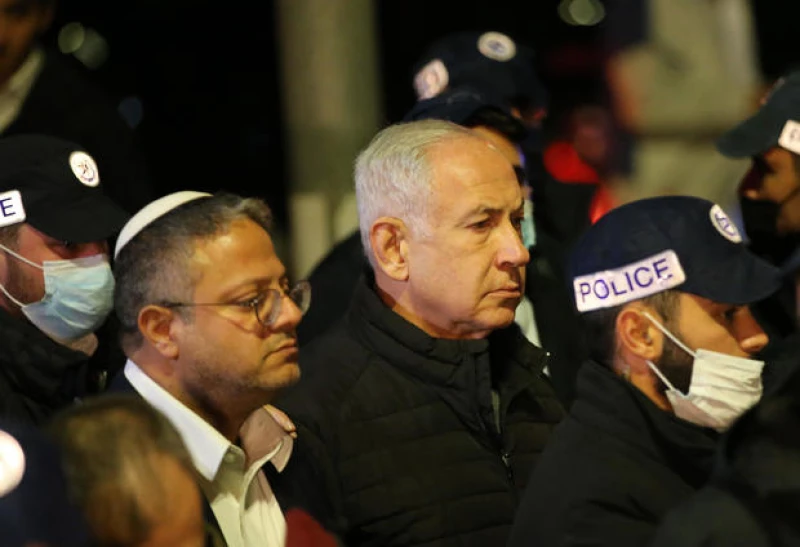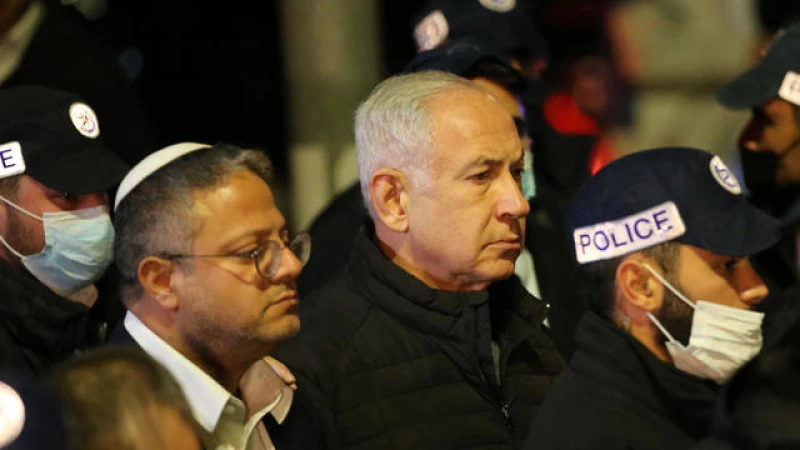Tel Aviv — In a recent development, some of Israel's top far-right politicians criticized President Biden for suggesting that the White House might halt additional weapons shipments to the Israeli military if it carries out a significant military ground operation in Gaza's southern city of Rafah.
The National Security Minister, Itamar Ben-Gvir, known for his ultra-nationalist views, took to social media to imply that the militant group Hamas was pleased with Biden's threat to withhold weapons, by posting a brief message with a heart emoji.
Additionally, Parliamentarian Dan Illouz, a member of Prime Minister Benjamin Netanyahu's Likud party, expressed concerns that Biden's actions could endanger not only Israel but the entire free world.

Israel's President Isaac Herzog, who is considered a more moderate figure and not part of Netanyahu's far-right coalition, appeared to rebuke his more extremist colleagues. Speaking at an event commemorating the victory over Nazi Germany in World War II, Herzog praised the United States as Israel's "greatest ally" and specifically thanked President Biden for his unwavering support since the beginning of the conflict.
"Clarifying Disputes Without Insults"
In a statement issued today, President Herzog emphasized the importance of resolving disagreements between friends and allies without resorting to harmful statements. "Even when there are disagreements and moments of disappointment between friends and allies, there is a way to clarify the disputes and it is beholden upon all of us to avoid baseless, irresponsible and insulting statements and tweets that harm the national security and the interests of the State of Israel," Herzog added.
Biden's Stance on Weapons Shipment
During an interview with CNN on Wednesday, President Biden expressed his concern over the potential use of U.S.-supplied weapons in attacks that could result in mass civilian deaths in a full-scale Rafah ground offensive. He stated that it would be "just wrong" if such weapons were used for that purpose and emphasized that the U.S. would not supply them for such operations.
Pause in Weapons Shipment
Recent reports confirm that the Biden administration halted a weapons shipment to Israel last week, which included 1,800 one-ton bombs and 1,700 500-pound bombs. This decision was made due to concerns that the Israel Defense Forces might use these weapons in attacks on Rafah, a densely-inhabited city in Gaza. The city is home to an estimated 1.4 million Palestinians who have sought shelter there amidst the ongoing conflict.
Following the IDF's order for residents in the eastern part of Rafah to evacuate, thousands of people were forced to flee, adding to the already dire humanitarian situation in the region.
IDF tanks rolled in to take control of the Gaza side of Rafah's crucial border crossing with Egypt on Tuesday, soon after the evacuation order was issued, and Israel said it was carrying out "a precise counterterrorism operation to eliminate Hamas terrorists and infrastructure" in the area.
"They're not going to get our support if in fact they go into these population centers," said Mr. Biden. "We're not walking away from Israel's security — we're walking away from Israel's ability to wage war in those areas."
Mr. Biden stressed that the U.S. would, "continue to make sure Israel is secure in terms of Iron Dome and their ability to respond to attacks that came out of the Middle East recently."
Netanyahu has said in recent days — amid mounting pressure from the U.S. and other global partners to limit the scope of operations in Rafah — that if "Israel is forced to stand alone, Israel will stand alone."
He's vowed to go ahead with the Rafah operation, which he's said for weeks is necessary to destroy hundreds of Hamas fighters holed up in the city. Rafah is considered the last stronghold of the group that ruled Gaza for almost two decades, before it sparked the current war with its deadly Oct. 7 terrorist attack on Israel.
Israel says Hamas killed about 1,200 people with that assault and took some 240 others hostage. About 100 of those captives are still believed to be alive in Gaza, including five U.S. nationals.
The enclave's Hamas-run Health Ministry, meanwhile, says Israel's retaliatory war has killed almost 35,000 people. Gazan officials do not distinguish between combatant and civilian casualties, and the IDF, without offering evidence, claims to have killed about 10,000 terrorists with its response to the Oct. 7 attack.
Since Israel heralded the start of its Rafah operations this week, frightened Gazans have fled daily from Israeli airstrikes, flooding the city's last functioning hospital, the Kuwaiti Hospital, with the dead and wounded.
"The health situation in Rafah is now very miserable," Dr. Jamal Al-Humss, the hospital's director-general, told CBS News. He said about 300,000 people in Rafah are now relying on the facility, which he warned was overflowing and understaffed.
In recent days, Hamas — long considered a terrorist group by the U.S. and Israel — has continued to launch rocket and mortar attacks from Rafah. One strike on Sunday killed four Israeli soldiers.
Israeli national security expert Chuck Freilich, at the Institute for National Security Studies at Tel Aviv University, accepts that there are likely still four Hamas battalions operating in Rafah. But speaking with CBS News on Thursday, he argued that Israel had already won and lost the war with Hamas.
"If you look at it from a purely military perspective, I think Israel won the war by the middle of December," he said. "We had essentially destroyed Hamas as a military force."
Reflecting on the recent events, Freilich expressed concerns about the outcome of the war. "If we look at the bigger strategic picture, it seems like Israel may have suffered a loss. Its global reputation has taken a hit, and there's now a noticeable rift with the United States," noted Freilich. "On the other hand, Hamas has achieved a remarkable success, which poses a significant challenge for us."







